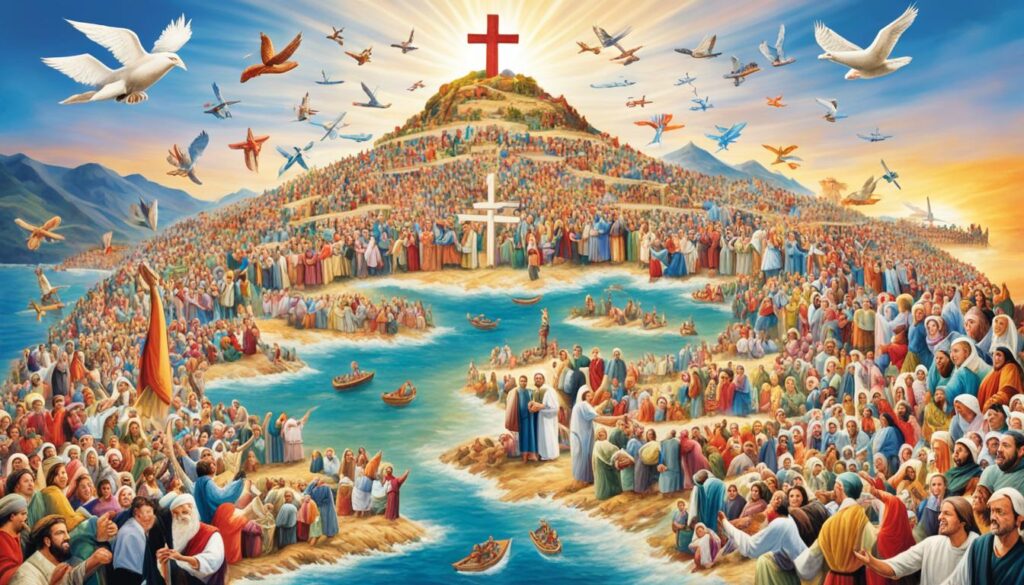Is the Great Commission Recorded 10 Times in the Bible?
As we explore the significance of the Great Commission in the Bible, we encounter a recurring theme that highlights its importance in the Christian faith. The Great Commission, Jesus’ commission to his disciples, is not just a single occurrence in Scripture; rather, it is recorded multiple times across various Gospel accounts and the book of Acts.
These accounts, found in Matthew, John, Luke, and Acts, emphasize the significance of the Commission and its relevance in shaping the missionary movement. The close connection between the Great Commission and the death and resurrection of Jesus further underscores its importance in spreading the message of the kingdom of God, repentance, and belief in the good news.
In these passages, Jesus instructs his disciples to go and make more disciples, baptizing them and teaching them to obey all of his teachings. This highlights the continuation of the mission through generations and emphasizes the transformative impact of the missionary movement.
Key Takeaways:
- The Great Commission is recorded multiple times in the Bible across various Gospel accounts and Acts, demonstrating its significance.
- Jesus’ death and resurrection are closely linked to the Commission, highlighting the importance of these events in shaping the missionary movement.
- The Commission involves bearing witness to Jesus’ life, death, and resurrection, spreading the message of the kingdom of God and calling for repentance and belief.
- Disciples are instructed to make more disciples, baptizing them and teaching them to obey all of Jesus’ teachings, ensuring the continuation of the mission through generations.
- The promise of Jesus’ abiding presence and the gift of the Holy Spirit play key roles in the success of the disciples’ mission.
With these multiple recordings of the Great Commission and the ongoing fulfillment of its mission, it becomes clear that its goal is to reach all nations, spreading the gospel message to the ends of the earth. The ultimate aim is to see repentant and forgiven disciples formed in community, obeying Jesus’ commands and experiencing the transformative power of the missionary movement.
The Authority and Commission of the Great Commission
The Great Commission, as recorded in the Gospels and Acts, carries an authority that emanates from the resurrected Jesus. In Matthew’s account, Jesus affirms that he has been given all authority in heaven and on earth. This divine authority empowers his disciples to fulfill their mission of reaching all nations and making new disciples.
Jesus commissions his disciples to preach the kingdom of God, calling people to repentance and belief in him. They are entrusted with the task of bearing witness to Jesus’ life, death, and resurrection, proclaiming the good news of salvation. This proclamation is not limited to a single moment in history but extends to every disciple throughout the ages, until the completion of the mission.
Furthermore, the disciples are instructed to baptize new believers, incorporating them into the community of faith. Baptism serves as a public declaration of faith and a symbol of identification with Christ’s death and resurrection. It is an essential step in the disciples’ mission of making disciples of all nations.
Teaching is another crucial aspect of the disciples’ commission. They are to instruct new believers in all that Jesus has commanded, guiding them in a life of obedience to his teachings. Teaching ensures that disciples not only receive salvation but also grow in their understanding and application of God’s Word.
“Go therefore and make disciples of all nations, baptizing them in the name of the Father and of the Son and of the Holy Spirit, teaching them to observe all that I have commanded you.”
The Great Commission’s scope is extensive, beginning in Jerusalem but reaching the uttermost limits of the earth. Jesus promises his presence and authority to be with his disciples and those who follow them to the ends of the earth and until the end of the age. This assurance of divine presence provides comfort, encouragement, and empowerment as the disciples face the challenges of fulfilling their mission.
Furthermore, the disciples receive the promise of the Holy Spirit, who will empower them to be witnesses to the world. The Holy Spirit’s indwelling presence equips the disciples with the necessary spiritual resources to effectively communicate the message of the gospel and accomplish their mission.
Ultimately, Jesus promises that the gospel of the kingdom will be preached in the whole world as a testimony to all nations before the end comes. This serves as a reminder of the urgency and importance of the disciples’ mission in advancing God’s kingdom and making disciples of all nations.
In conclusion, the Great Commission carries the authority of the resurrected Jesus. It entails preaching the kingdom of God, baptizing new believers, teaching them to obey Jesus’ commands, and reaching all nations with the gospel. This divine authority, coupled with the promise of Jesus’ presence and the empowerment of the Holy Spirit, ensures the fulfillment of the disciples’ mission throughout history.
The Promise of the Great Commission
One of the remarkable aspects of the Great Commission is the promise that accompanies it. Throughout the Gospels and Acts, Jesus repeatedly assures his disciples that he will be with them always, even until the end of the age. This promise reinforces the significance and the magnitude of the mission they are embarking on.
As Jesus appeared to his disciples over a span of 40 days, he emphasized the divine nature of their mission. The movement of missionary work is described as a work of God, with His authority, commission, and promise ensuring its success source.
The disciples are entrusted with the task of bearing witness to the significance of Jesus’ life, death, and resurrection. They are called to preach a message of repentance and belief in the kingdom of God. This promise of God’s presence and empowerment through the Holy Spirit gives them the confidence and courage to fulfill their mission.
Through the Great Commission, Jesus instructs his disciples to make disciples of all nations. They are to baptize those who repent and believe and teach them to obey everything he has commanded. This mission is not limited to a specific time or place; it is a call for all disciples throughout time until the task is completed.
The promise made by the risen Lord extends beyond the disciples and their immediate followers. It reaches to the ends of the earth and the end of the age. Jesus sends the Holy Spirit to empower his disciples and their followers to carry out the mission. This promise ensures that the spread of the gospel to all nations is not just a temporary endeavor but a key aspect of the Great Commission, leading to the eventual coming of the end times.
Jesus’ promise of his presence, authority, and the gift of the Holy Spirit underscores the importance of the Great Commission. It assures believers that their efforts to spread the gospel and make disciples are not in vain. The promise reinforces the truth that the mission is not solely reliant on human strength and abilities but is sustained by the power and guidance of God.
The Range of Activities in the Great Commission
The Great Commission encompasses a diverse range of activities that are essential for fulfilling the mission of spreading the gospel and making disciples. These activities are recorded in the concluding sections of each of the gospels and at the beginning of the book of Acts, emphasizing their significance in the Christian faith.
Matthew chapter twenty-eight provides the most comprehensive account of the Great Commission. Here, Jesus commands his disciples to go to all nations and teach them to observe all that he had commanded. This highlights the importance of disciple-making as an integral part of the Commission.
In addition to teaching, the Great Commission includes the act of baptism. As disciples go to all nations, they are to baptize converts, symbolizing their identification with Christ’s death, burial, and resurrection. The practice of immersion, observed in the examples from the gospels and John the Baptist’s practice, is the mode employed for baptism.
The disciples are instructed to teach new believers to observe “all things whatsoever” commanded by Jesus. This underlines the comprehensive nature of the Commission, encompassing the entire body of Biblical doctrine. Teaching Biblical doctrine is crucial in equipping new disciples to live out their faith and make others disciples.
Furthermore, the Great Commission calls for disciples to be witnesses to the ends of the earth. This emphasizes the importance of actively sharing the gospel message and being a testimony of Jesus’ life, death, and resurrection to people from all nations.
Overall, the Great Commission involves going, baptizing, teaching, and being witnesses. These activities work together to fulfill the mandate of making disciples of all nations. The text provides a Biblical basis for evangelistic endeavors in foreign lands and highlights the comprehensive nature of the Commission.

Parachurch organizations, although they may engage in evangelistic activities and mission work, are mentioned as being unable to fulfill the Great Commission completely. This is because they lack the authority to baptize and may not teach all things commanded by Jesus due to their supra-church status. This could potentially lead to a watering down of Biblical doctrine.
The Importance of Proclamation and Witnessing in the Great Commission
In the different accounts of the Great Commission, the calling to proclaim and witness to the gospel is central. Jesus instructs his disciples to go into all the world and preach the good news, making disciples through the proclamation of repentance and forgiveness of sins. Being witnesses of Jesus’ life, death, and resurrection is a vital part of fulfilling the Great Commission and spreading the message of salvation.
When we think about the significance of the Great Commission in scripture, we understand that it places a strong emphasis on proclaiming the gospel to all nations. This involves stepping out of our comfort zones, boldly sharing our faith, and inviting others to experience the transformative power of Jesus’ love and grace. By proclaiming the good news, we become ambassadors of Christ, offering hope and redemption to those who are lost.
Jesus’ commission to go and make disciples requires us to actively engage with people from diverse backgrounds and cultures. Our witness extends beyond words; it encompasses our actions, attitudes, and lifestyles. Living as faithful followers of Christ is not only a testament to the truth of the gospel, but it also draws others to inquire about the hope and joy we possess. By genuinely embodying the message of the Great Commission, we have the privilege of introducing others to Jesus and guiding them in their journey of faith.
“Go therefore and make disciples of all nations, baptizing them in the name of the Father and of the Son and of the Holy Spirit, teaching them to observe all that I have commanded you. And behold, I am with you always, to the end of the age.” – Matthew 28:19-20
The Great Commission is not a passive call; it is an urgent and active invitation for every believer to participate in God’s redemptive plan. As we embrace our role as witnesses, we can confidently share the hope of salvation, pointing others towards the transformative love and power of Jesus. Whether it is through personal conversations, public speaking, or utilizing technology to reach a global audience, we have countless opportunities to fulfill the Great Commission and play our part in advancing God’s kingdom.
By recognizing the significance of proclamation and witnessing in the Great Commission, we can prioritize sharing the gospel, making disciples, and advocating for justice and righteousness. We are called to be salt and light in a world desperate for truth and reconciliation. Through our faithful obedience to the Great Commission, we actively participate in God’s plan to reconcile humanity to Himself and restore all things.
The Role of Baptism in the Great Commission
Baptism holds a significant place within the Great Commission, as it symbolizes the believer’s identification with the death, burial, and resurrection of Christ. In obedience to Jesus’ command, the disciples are instructed to baptize new believers in the name of the Father, Son, and Holy Spirit.
While baptism itself does not save, it serves as a public declaration of one’s faith and a commitment to follow Jesus. Through baptism, individuals publicly acknowledge their belief in Christ and their desire to live a life transformed by His teachings.
“Go therefore and make disciples of all nations, baptizing them in the name of the Father and of the Son and of the Holy Spirit.”
Baptism holds deep spiritual symbolism, illustrating the inner transformation that takes place in the life of a believer through faith in Jesus. Just as Jesus was buried and resurrected, baptism represents the believer’s identification with His death, purification from sin, and emergence into newness of life.
Furthermore, baptism serves as a public testimony of one’s faith, allowing others to witness the individual’s commitment to follow Jesus. It provides an opportunity to share the story of God’s grace and redemption, highlighting the transformative power of the gospel.
Throughout the Bible, baptism is depicted as an important step in the journey of faith. In the book of Acts, we see repeated instances of individuals being baptized immediately after professing their belief in Jesus. This practice demonstrates the significance of baptism as an essential part of the Great Commission.
“And now why do you wait? Rise and be baptized and wash away your sins, calling on his name.”
As we engage in the Great Commission, baptizing new believers is not merely a ritual, but a profound act of obedience, symbolizing their identification with Christ and their commitment to His teachings. It allows individuals to publicly declare their faith, inviting others to witness the transformation that has taken place in their lives.
Therefore, let us recognize the integral role baptism plays in fulfilling the Great Commission as we follow Jesus’ command to make disciples of all nations.
The Role of Teaching in the Great Commission
In fulfilling the Great Commission, teaching plays a crucial role. Jesus, in his commission to his disciples, instructed them to teach new believers to observe all that he commanded. This emphasizes the importance of discipleship and ongoing instruction for followers of Jesus.
As disciples, it is our responsibility to teach the truths of the gospel and the principles of a Christ-centered life. Through teaching, we equip believers with the knowledge and understanding they need to live out their faith and fulfill the purpose of the Great Commission.
The act of teaching encompasses various aspects of the Commission, such as preaching repentance for the forgiveness of sins, making disciples through baptism, and teaching obedience to Jesus’ commands. Teaching enables new believers to grow in their relationship with God and deepen their understanding of His Word.
By embracing the role of teaching, we contribute to the spread of the gospel and the development of strong, mature disciples. Through teaching, we empower individuals to become equipped ambassadors of Christ, able to effectively share the good news with others.
We also recognize the significance of teaching as we fulfill the Commission’s mandate to reach all nations. Starting in Jerusalem, the disciples were tasked with spreading the message of Jesus’ life, death, and resurrection to every people group, until the ends of the earth. This requires teaching that transcends cultural and language barriers to communicate the transformative power of the gospel.
Furthermore, as we engage in teaching, we uphold the promise from the risen Lord to be with us until the end of the age, through the power of the Holy Spirit. The Holy Spirit guides us in our teaching, illuminating Scripture and empowering us to effectively communicate God’s truth to those we disciple.
In the context of the Great Commission, teaching is not limited to formal classrooms or structured settings. It encompasses various approaches, including one-on-one mentoring, small group studies, preaching, and online platforms. The goal is to impart knowledge, wisdom, and application of God’s Word, cultivating a desire for a deeper relationship with Jesus.
Through teaching, we prepare disciples to fulfill their own role in making more disciples, reproducing the work that Jesus began. By equipping others to teach and disciple, we ensure the continuation of the Great Commission and the transformation of lives around the world.
In conclusion, teaching is an integral part of the Great Commission. It equips believers, extends the message of God’s love and redemption to all nations, and empowers us to fulfill our calling as followers of Jesus. Through teaching, we contribute to the growth of the Kingdom of God and the spread of the gospel throughout the world.
The Power of Prayer in the Great Commission
While the Great Commission recorded in the Bible emphasizes activities such as going, preaching the gospel, baptizing, and teaching, the role of prayer is equally vital in fulfilling this mission. Although the accounts of the Great Commission do not explicitly mention prayer, it is an underlying principle that should permeate our efforts to spread the gospel and make disciples.
Prayer plays a crucial role in the advancement of God’s kingdom and the obedience of all nations to His will. It is through prayer that we seek God’s guidance, empowerment, and provision in reaching the world with the message of salvation. Just as Jesus Himself dedicated time to pray and sought the Father’s will, we too should prioritize prayer as an essential aspect of carrying out the Great Commission.
In His teachings, Jesus emphasized the significance of prayer. In the Sermon on the Mount, He taught His followers to pray for God’s kingdom to come and His will to be done on earth as it is in heaven. This aligns with the ultimate goal of the Great Commission, which is to establish mature, vibrant, and autonomous churches that continue the work of disciple-making and missions.
Prayer is our direct line of communication with God, enabling us to intercede on behalf of others and seek His intervention in the hearts of those who are lost. It is an essential spiritual weapon that empowers us and invites God’s supernatural intervention in fulfilling the Great Commission.
As we faithfully pray, we acknowledge our dependence on God and His sovereignty in the work of spreading the gospel. We recognize that our efforts alone are insufficient, and it is through His power and guidance that true transformation occurs in the hearts and lives of people.
While technology has become a valuable tool for communication and missions, it cannot replace the significance of physical presence and personal interaction in fulfilling the Great Commission. Through prayer, we engage with God’s heart and align ourselves with His purposes, allowing Him to work through us as His ambassadors.
As we pray for the advancement of God’s kingdom, we also pray for the Holy Spirit’s empowerment and guidance in effectively proclaiming the gospel. We pray for open doors, receptive hearts, and divine appointments with individuals who need to hear the message of salvation. Prayer equips us to face challenges, overcome obstacles, and persevere in the face of opposition.
Ultimately, prayer is our lifeline in the fulfillment of the Great Commission. It is a powerful tool that aligns our hearts with God’s heart, sustains us in the midst of the mission, and invites His presence and power into every aspect of our efforts. Let us, therefore, approach the Great Commission with a posture of prayer, relying on God’s strength and trusting in His faithfulness to fulfill His purpose through us.
The Synonymous Nature of the Great Commission
When we examine the various accounts of the Great Commission in the Bible, we may notice slight differences in wording, but the message and purpose remain consistent. Whether it is referred to as making disciples, proclaiming the gospel, being witnesses, or sending out with a message, the central theme remains the same: spreading the good news of Jesus, calling people to repentance and faith, and making disciples of all nations.
The Great Commission is not recorded with identical phrasing in every instance, but the essence of the command remains unchanged. This synonymous nature of the Great Commission highlights its universal significance and underscores the importance of its message throughout the Bible.
References to the Great Commission can be found in multiple passages, such as Matthew 28, Mark 16, Luke 24, John 20, and Acts 1. These scriptural occurrences emphasize the global nature of the commission and the call for believers to actively engage in the mission of sharing the gospel with people from all walks of life.
German theologian Thomas Schirrmacher calls the Great Commission the most important passage in the Gospel of Matthew, underscoring its central role in Christian teachings and missions.
Understanding the true depth and scope of the Great Commission is vital for believers today. The challenge we face in fulfilling Christ’s commission lies not in its lack of clarity or relevance, but rather in the Church’s lack of passion. Recent polls by the Barna Group indicate that a majority of churchgoers have no idea what the Great Commission truly entails, illustrating the need for greater education and emphasis on this foundational command.
Acts 1:8 portrays the Great Commission as both a charge and a promise. The disciples are called to be witnesses to Jesus in Jerusalem, Judea, Samaria, and to the ends of the earth. This commission is filled with the power of the Holy Spirit, empowering believers to take the good news everywhere and to everyone.
The Significance of the Great Commission in Missions
References to Christ’s Great Commission in missions literature are abundant, highlighting the importance of world evangelism in Christian teachings. The Great Commission serves as a guiding principle and motivation for believers to actively engage in reaching the nations with the message of salvation.
In the Bible, the word “nations” does not solely refer to geopolitical entities but also encompasses people groups, societies with a common language and culture. This demonstrates the diversity of humanity and emphasizes the global scope of the commission.
The early Church recognized the urgent need to spread the message simultaneously to all regions. Instead of following a linear progression, they understood the importance of reaching different areas and people groups simultaneously. Their actions align with the spirit of the Great Commission.
The Great Commission is often perceived as a command to be obeyed, given the weight and importance it carries. Quotes from various Christian figures throughout history emphasize its significance and the obligation it implies. When we understand the synonymous nature of the Great Commission and its relevance in our lives, we can actively participate in fulfilling Jesus’ command, making disciples of all nations and sharing the life-changing message of the gospel.
Understanding the Translation of the Great Commission
There have been discussions about the translation of the Great Commission, particularly in Matthew 28:19. The King James Version translates it as “teach all nations,” while modern translations often use “make disciples of all nations.” Both translations are valid and convey the same idea. The emphasis is on teaching and making disciples who will follow Jesus and be obedient to his commands.

The Significance of Translation: Teach or Make Disciples?
In Matthew 28:19, the choice of translation has sparked debates among scholars and theologians. The King James Version’s use of “teach” places emphasis on the act of instructing or imparting knowledge. On the other hand, modern translations opt for “make disciples,” highlighting the process of not just teaching but also mentoring and guiding individuals towards a transformational relationship with Jesus.
Both translations capture the essence of the Great Commission, which encompasses the teaching and discipling of all nations.
The choice of translation may vary based on theological interpretation and the preference of translation committees. Regardless of the specific wording, the overarching meaning remains the same: believers are called to share the teachings of Jesus and help others become committed followers through instruction, mentoring, and discipleship.
Personal Reflections on the Great Commission’s Application
When it comes to applying the Great Commission in modern ministry, different perspectives and approaches exist. Some emphasize the importance of small group discipleship, fostering intimate relationships and spiritual growth. Others focus on the power of preaching and proclamation, aiming to reach a wider audience with the message of salvation.
At times, the emphasis on small group discipleship allows for deeper connections and individualized attention, helping individuals grow in their faith and understanding of the Gospel. The intimate setting provides the opportunity for open discussions, mentoring, and accountability. It’s a powerful way to impact lives and make disciples in a more personal and relational manner.
On the other hand, the emphasis on preaching and proclamation can lead to reaching a wider audience and sharing the Gospel with those who may have never heard it before. Public speaking, evangelistic campaigns, and mass gatherings enable the message of Jesus to be proclaimed in a powerful and impactful way. These methods can create an atmosphere that stirs hearts and plants seeds of faith in the lives of many.
It is essential to recognize that both approaches can be effective in fulfilling the mission of the Great Commission. While one may resonate more with particular individuals or communities, the key is to faithfully follow Jesus’ example and guidance in reaching the lost and making disciples. As we seek the Lord’s direction and wisdom, he will guide us in the most fruitful way to carry out the Great Commission.
The Importance of Discernment
“Therefore, whether we focus on small group discipleship or preaching and proclamation, it is crucial to exercise discernment and adapt our methods to the context we find ourselves in. Every ministry situation is unique, and the needs of individuals vary.”
Ultimately, the application of the Great Commission is not a one-size-fits-all approach. It requires an understanding of the cultural, demographic, and spiritual dynamics of the people we are trying to reach. What works in one setting may not work in another, and what resonates with one person may not resonate with another.
As we navigate the complexities of modern ministry, let us seek the guidance of the Holy Spirit, who empowers us to discern the most effective strategies and methods for fulfilling the Great Commission. Together, as the body of Christ, we can reach the nations with the love and truth of Jesus, making disciples and transforming lives.
Conclusion
The Great Commission is a significant biblical concept that is reiterated throughout the Bible, revealing its enduring importance within scripture and faith. The message it conveys remains unwavering despite variations in wording: to spread the good news of Jesus, make disciples of all nations, and be witnesses to the ends of the earth. As believers, this commission guides us in fulfilling our mission to share the love and salvation of Jesus with the world.
Throughout the Gospels and the book of Acts, we find multiple instances of Jesus commissioning his disciples to continue his work. These passages, found in Matthew, Mark, Luke, John, and Acts, provide distinct accounts of this divine calling and highlight the universality of the Great Commission across scripture.
In obeying the Great Commission, we are empowered by the authority entrusted to us by the resurrected Jesus. It is through his authority that we are called to go forth, preach the kingdom of God, call for repentance and belief, baptize new believers, and teach them to follow Jesus’ commands. Although our methods may vary, our purpose remains the same: to make disciples and advance the kingdom of God.
FAQ
Is the Great Commission Recorded 10 Times in the Bible?
Yes, the concept of the Great Commission is recorded multiple times in the Bible. It is found in the Gospels and the book of Acts, specifically in Matthew 28, Mark 16, Luke 24, John 20, and Acts 1.
What is the Authority and Commission of the Great Commission?
The Great Commission carries an authority that comes from the resurrected Jesus. In Matthew’s account, Jesus states that all authority in heaven and on earth has been given to him, empowering his disciples to go and make disciples of all nations.
What Promise is Given in Relation to the Great Commission?
Jesus promises his disciples that he will be with them always, even until the end of the age. This promise is reiterated in the different accounts of the Great Commission, assuring his followers that they will receive the Holy Spirit, who will empower them to be witnesses to the world.
What Activities are Involved in the Great Commission?
The Great Commission involves going to all nations and proclaiming the gospel, baptizing new believers, teaching them to observe all that Jesus commanded, and being witnesses to the ends of the earth.
What is the Importance of Proclamation and Witnessing in the Great Commission?
Proclaiming and witnessing the gospel is central to the Great Commission. Jesus instructs his disciples to go into all the world and preach the good news, making disciples through the proclamation of repentance and forgiveness of sins.
What Role Does Baptism Play in the Great Commission?
Baptism is highlighted as an important aspect of the Great Commission. The disciples are commanded to baptize new believers in the name of the Father, Son, and Holy Spirit, symbolizing their identification with Christ’s death, burial, and resurrection.
What Role Does Teaching Play in the Great Commission?
Teaching is significant in the Great Commission. Jesus instructs his disciples to teach new believers to observe all that he commanded, emphasizing the importance of discipleship and ongoing instruction in the faith.
What is the Power of Prayer in the Great Commission?
While not explicitly mentioned in the accounts of the Great Commission, prayer is an underlying principle. The disciples are to pray for the advancement of God’s kingdom and the obedience of all nations to God’s will, seeking guidance, empowerment, and provision in fulfilling the mission.
Are the Different Accounts of the Great Commission Synonymous?
Yes, the different accounts of the Great Commission may use different wording, but they convey the same message and purpose of spreading the good news of Jesus, calling people to repentance and faith, and making disciples of all nations.
How Should the Translation of the Great Commission be Understood?
There have been discussions about the translation of the Great Commission, particularly in Matthew 28:19. The King James Version translates it as “teach all nations,” while modern translations often use “make disciples of all nations.” Both translations are valid and convey the same idea of teaching and making disciples.
How Should the Great Commission be Applied in Modern Ministry?
Different perspectives exist on how to apply the Great Commission in modern ministry. Some emphasize small group discipleship, while others emphasize preaching and proclamation. Both approaches can be effective, and the key is to faithfully follow Jesus’ example and guidance in reaching the lost and making disciples.
What is the Significance of the Great Commission in Scripture?
The Great Commission is a significant biblical concept, emphasizing its importance in scripture and faith. It serves as a guiding principle for believers in fulfilling their mission to share the love and salvation of Jesus with the world.
How Many Times is the Great Commission Mentioned in the Bible?
The concept of the Great Commission is recorded multiple times in the Bible, specifically in Matthew 28, Mark 16, Luke 24, John 20, and Acts 1.







